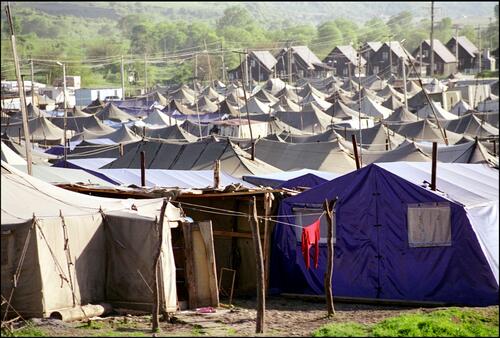Paris/Moscow - Today, during its Press Conference, Médecins Sans Frontières reveals the results of a survey carried out between the 3rd and 16th of February 2003 in the eight tent camps of displaced Chechens in Ingushetia. This survey, which concerned 3,209 families, shows that 98% of the Chechen population living in tents in Ingushetia, do not want to return to Chechnya, mainly because they fear for their life.
Today, the situation in Chechnya continues to be insecure for civilians. 93% of families who were not planning on returning to Chechnya in the near future, give insecurity as a reason. Chechen families refuse to go back to Chechnya even though their living conditions in the tent camps continue to be totally unacceptable, with 54% of families living in tents that either leak, do not have cold protection or floor.
Most importantly, 90% do not know of an alternative shelter where to stay in Ingushetia if the camps close.
"If the camps are closed, said a displaced family, I will dig a pit in the ground and sit together with my children."
The results speak for themselves, showing the need for construction and provision of alternative shelters for at least the 2,827 families (14,443 people) in all tent camps.
Thus humanitarian aid in Ingushetia - which is of very poor quality - is not an incentive for people to stay. 88% of interviewed families did not mention aid at all as a reason for not going back. This contradicts official statements that assistance in Ingushetia keeps people from going back to Chechnya. However, aid in Chechnya is also insufficient, notably because the insecurity threatening Chechen civilians is also threatening humanitarian workers.
Families do not have the option to stay in Ingushetia. In spite of people’s choice to stay in Ingushetia and of official statements that no one will be forced back, the provision of alternative shelter by humanitarian organisations continues to be blocked.
At the end of January 2003, Ingush authorities suddenly declared the MSF temporary shelters illegal. Mr. Zyazikov, the Ingush president, has twice given his approval to this program. Yet, a month after our last meeting with the president, shelter construction is still completely blocked by the authorities.
The most vulnerable families, identified through this survey, have not been allowed to move in the 180 shelters that are already completed. The additional 1,200 rooms planned for construction are stalled.
The MSF survey shows, without any doubt, that displaced families from Chechnya do not want to return to Chechnya, and that they are given no other place to stay in Ingushetia. People do not return on a voluntary basis, they simply give up under the pressure to push them back.
"The basic rights of this population are denied, said Anne Fouchard, the principle of voluntary return is violated, as people are left without a choice."
MSF calls upon President Zyazikov and federal authorities to respect people’s basic rights not to be forced back to Chechnya. MSF also demands Ingush authorities to stop administrative harassment against humanitarian organizations trying to provide assistance to refugees.
Finally, MSF calls upon UN agencies mandated to guarantee that the choice of people who want to stay is being respected, to really act toward the protection of the displaced families from Chechnya and to take a clear position regarding the current forced return.





